Just like many other Brits I’m a huge fan of Poundland. Bargain central. From their slap-in-the-face Toblerone rip off Twin Peaks bar to being able to spend a fiver on kids’ toys to keep them happy at the park – you’re always on to a winner when it comes to Poundland.
That being said, I’ve a bone or two to pick when it comes to their recent migration (or lack of). Here’s my £1’s worth…
So, what’s the problem exactly?
Before we dive into precisely what’s wrong here, first lets paint the picture with some context… Last June Poundland rolled out an ecommerce pilot over on a subdomain; shop.poundland.co.uk and more recently they’ve announced the termination of that very pilot attached some interesting news to boot.
As for famous saying goes; if you can’t beat them – join them. It looks like Poundland have done exactly that, have spent a few quid of their own and acquired poundshop.com, which in my simple mind was a competitor to Poundland that existed and operated exclusively online.
As far as buy-outs and acquisitions go, this one looks great on the surface; however how the two pound retailers appear to be tying together their merge looks pretty questionable and if what we’re able to see is to be believed as ‘job done’ Poundland are leaving equity, sales and organic traffic on the table. Let’s take a closer look…
A closer look at shop.poundland.co.uk
Although Poundland’s pilot only ran for approximately a year, it picked up some seriously impressive equity in that time with links from the likes of aol.com (yup AOL is still a thing, apparently), The Sun, Express & Star and some other juicy/authoritative websites too.
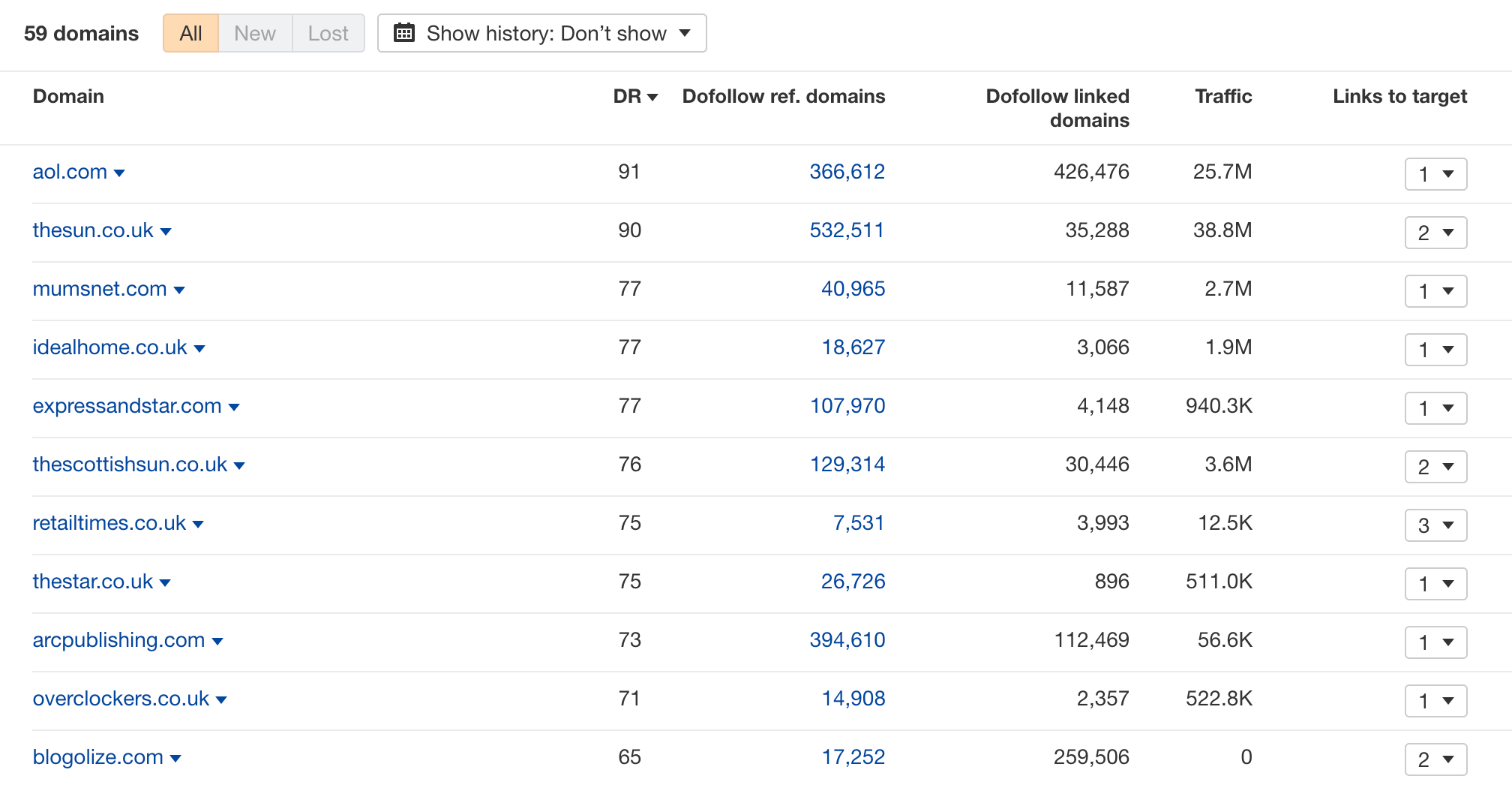
These links won’t only have dramatically helped their organic performance but it’s likely they’ll be driving a tidy amount of referral traffic too.
What’s interesting (or worrying) about the site is that all URLs on the retailer’s ecommerce store now look like this:
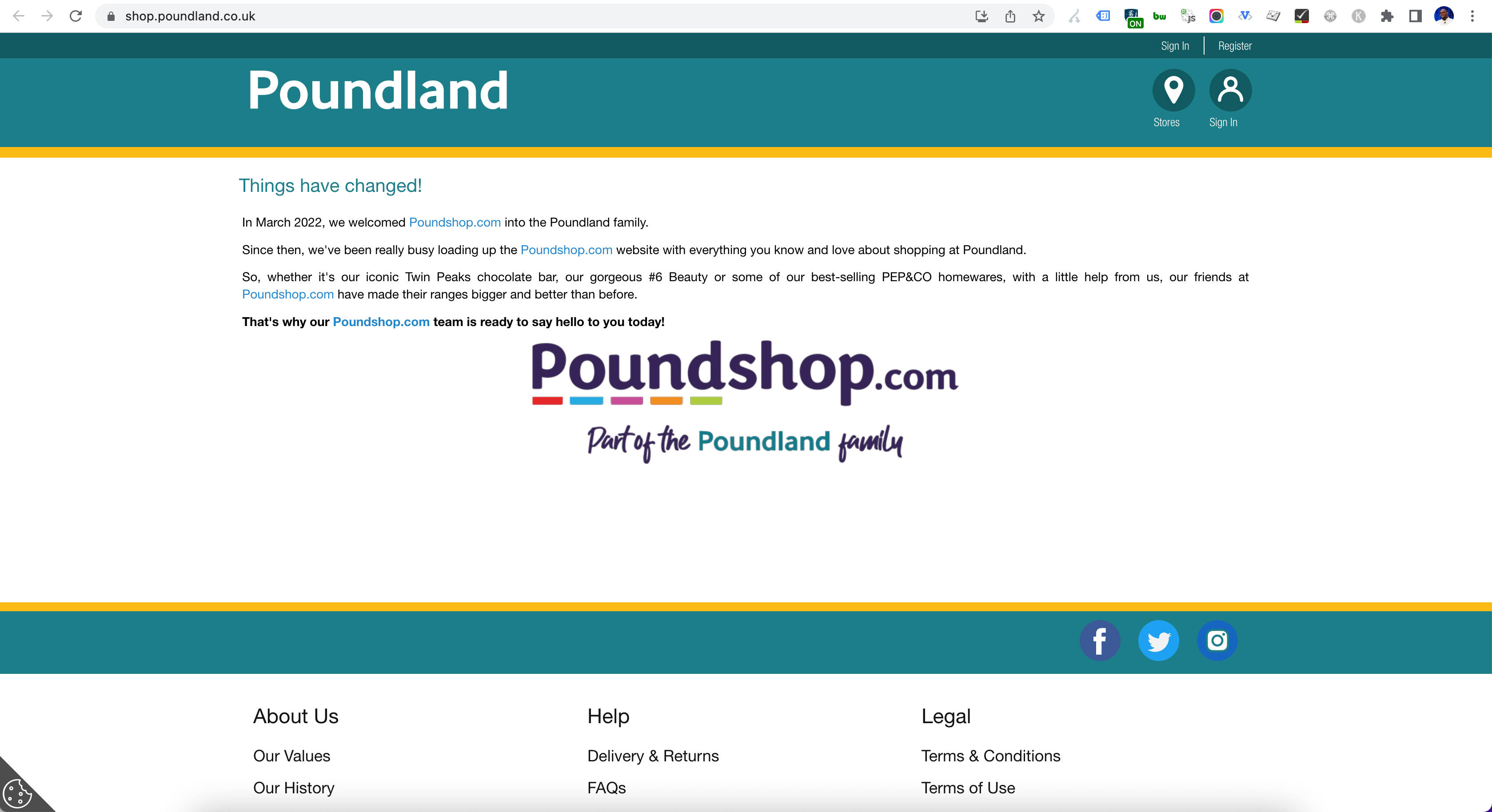
Whether you land on the HP of the site, enter the site via a now dead product URL or any other ecommerce page for that matter, you’ll be presented with this generic message and that’s a real missed opportunity for several reasons:
All URLs return a 200 status code and display the same identical page
There’s no HTTP redirects in place (not even JavaScript redirects). Additionally, regardless of the URL you land on, the browser always and only ever displays shop.poundland.co.uk with the page pictured above.
In fact, this very much looks like a masked redirect or it’s also known as an iframe redirect. Now when it comes to SEO, you’d be hard pressed to handle redirects in a worse way. Masking is a controversial topic in the world of SEO and it’s definitely best avoided where possible; leveraging a HTTP redirect instead – preferably a 301.
It delivers a poor user experience costing sales – here’s a better option
If Poundland’s statement is to be taken literally, items from the pilot store are now for sale over on poundshop.com. Instead of showing the above static page, they could have redirected products, categories and other URLs to their respective URLs over on the new store.
To take this a step further and what I’ve seen work well remaining sympathetic to both SEO and UX is to implement 301 redirects and add a unique URL parameter. This allows you to deliver a notice and information of the merge exclusively for visitors who’ve been redirected from the old store.
Here’s how it works:
- A visitor navigates to shop.poundland.co.uk/product and is then 301 redirected to poundshop.com/product?r=poundland (notice the parameter here)
- poundshop.com/product?r=poundland is then redirected to poundshop.com/newproduct?r=poundland (preserving the URL parameter but redirecting to the right page)
- The destination URL then has a canonical tag canonicalising /newproduct?r=poundland to /newproduct to prevent duplication/bloat issues
- The website then uses the ?r=poundland parameter to see that the visitor has been redirected from the decommissioned poundland store and displays a banner/notice/message letting them know of the merge whilst still sending them to the correct equivalent item on the new website.
Bonus: The ?r=poundland parameter can then be filtered for in Google Analytics or your preferred web analytics to identify how much traffic is actually being sent from the old website and see how much revenue is being generated from these sessions.
Pros
- Redirects are managed on the new site so they can be amended easier and kept up to date
- Analytics can be tied to the parameter to get close to the key visitor and ecommerce stats
- The ideal compromise between SEO and UX; giving visitors a clean experience and a watertight migration from an SEO perspective too
Cons
- More work to implement likely requiring development resource/support
- Leverages a parameter which can cause SEO issues without proper canonicalisation in place
- Requires the old hosting and domain to remain active indefinitely
- Could appear slow on load as params often aren’t cached. This on top of time for redirect to complete could impact load times.
Although this adds another redirect hop potentially compromising equity passover from the old to the new website; this can work as a great compromise between UX and SEO to get the best of both worlds and makes it easier to track relevant KPIs and traffic from the old website too.
So, why should Poundland care about SEO when the store no longer exists?
Good question! As we’ve touched on, there’s an impressive amount of equity on the table here; not managing this correctly can lose Poundland sales and customers.
Strictly speaking from an SEO perspective, not taking SEO seriously is likely going to cause Poundland to loose large amounts of desirable keywords in addition to haemorrhaging a sizeable amount of ‘free’ organic too – potentially handing over those rankings to direct competitors.
In summary, it’s about what Poundland is losing by not taking SEO seriously rather than what they’ll gain. Let’s dig deeper.
Poundshop.com is missing out on a potential boost in organic traffic and an increase in authority
According to ahrefs shop.poundland.co.uk is already experiencing a sharp decrease in the number of organic visits since it was taken down and in the last 30 days alone, it’s lost almost 1000 or its 6,200 organic keywords too.
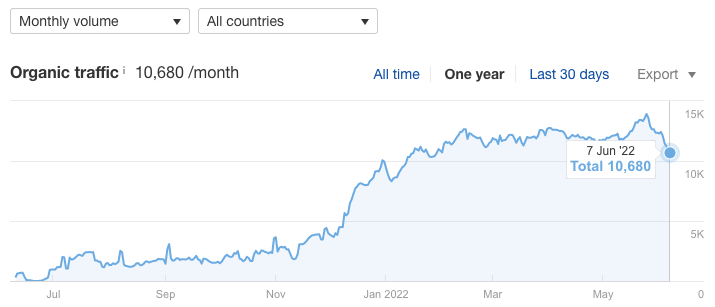
Sistrix is reporting a similarly aggressive decline in just a few days with a decrease of more than 50% of keywords that rank in the top 100 positions
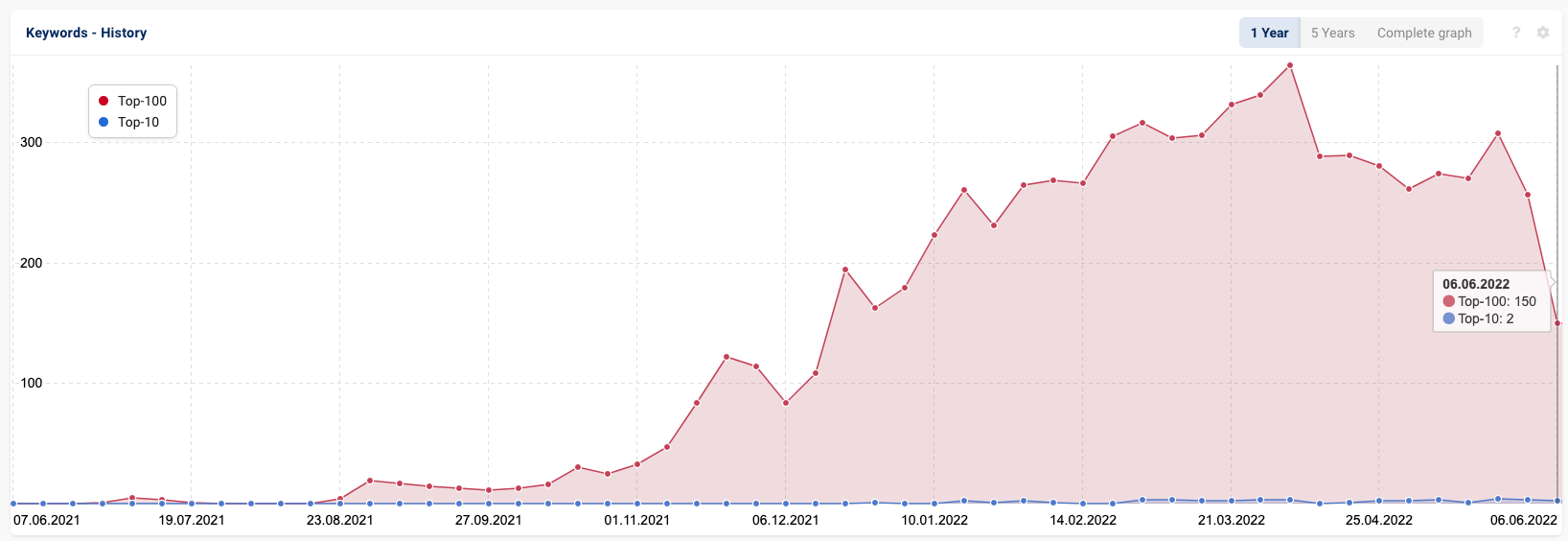
Because nothing has been redirected/migrated, these keywords are and will continue to simply diminish. Consequentially so will the organic traffic too. By not redirecting URLs over to the website’s new home over on poundshop is being robbed of this traffic and a chunk of those keywords too.
Desirable and lucrative ‘Poundland’ branded keywords are likely to be lost
For example both ‘poundland online’ and ‘poundland online shopping’ are two example branded keywords that Poundland’s ecommerce store ranked in #1 for both drive healthy amounts of traffic. According to ahrefs:
- Poundland online = 12k searches per month
- Poundland online shopping = 900 searches per month
Now their ecommerce store has closed it doors, its now only their main site that ranks for these terms alongside a competing online retailer (Online Pound Store) ranking in pos 2. Poundshop.com ranks much further down the page in position 6.
Ranking for organic keywords that would have previously driven engaged visitors with purchase-intent and sales now risk being lost to competitors or referred to their non-transactional website.
Poundshop.com can do more to rank higher for poundland keywords
To use an example the keywords ‘poundland delivery’ and ‘poundland deliveries drives 1.3k and 1.2k searches per month respectively.
Yet the page that ranks for this keyword in #1 is a static page on the shop.poundland.co.uk site, which of course is no longer relevant.
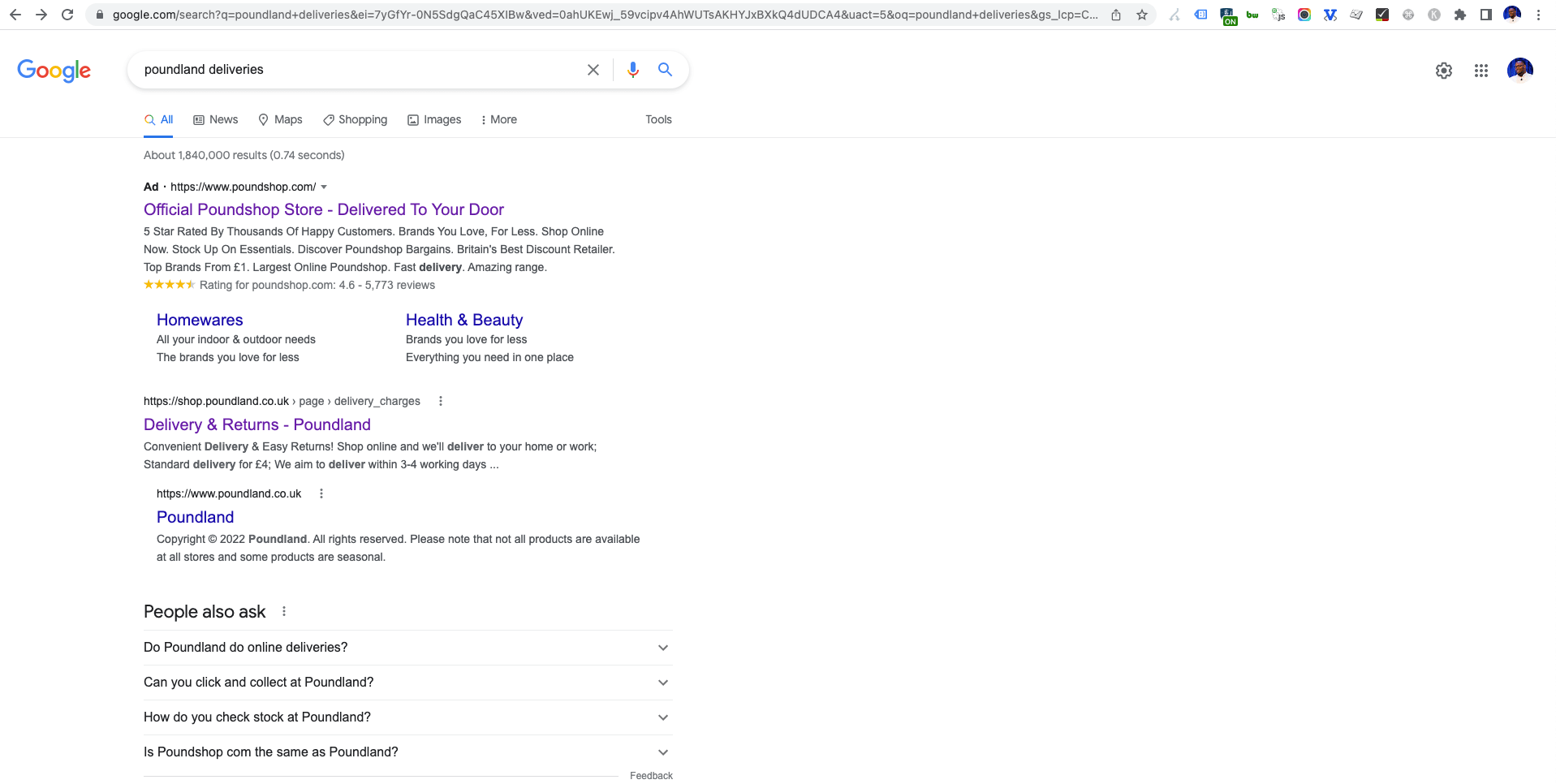
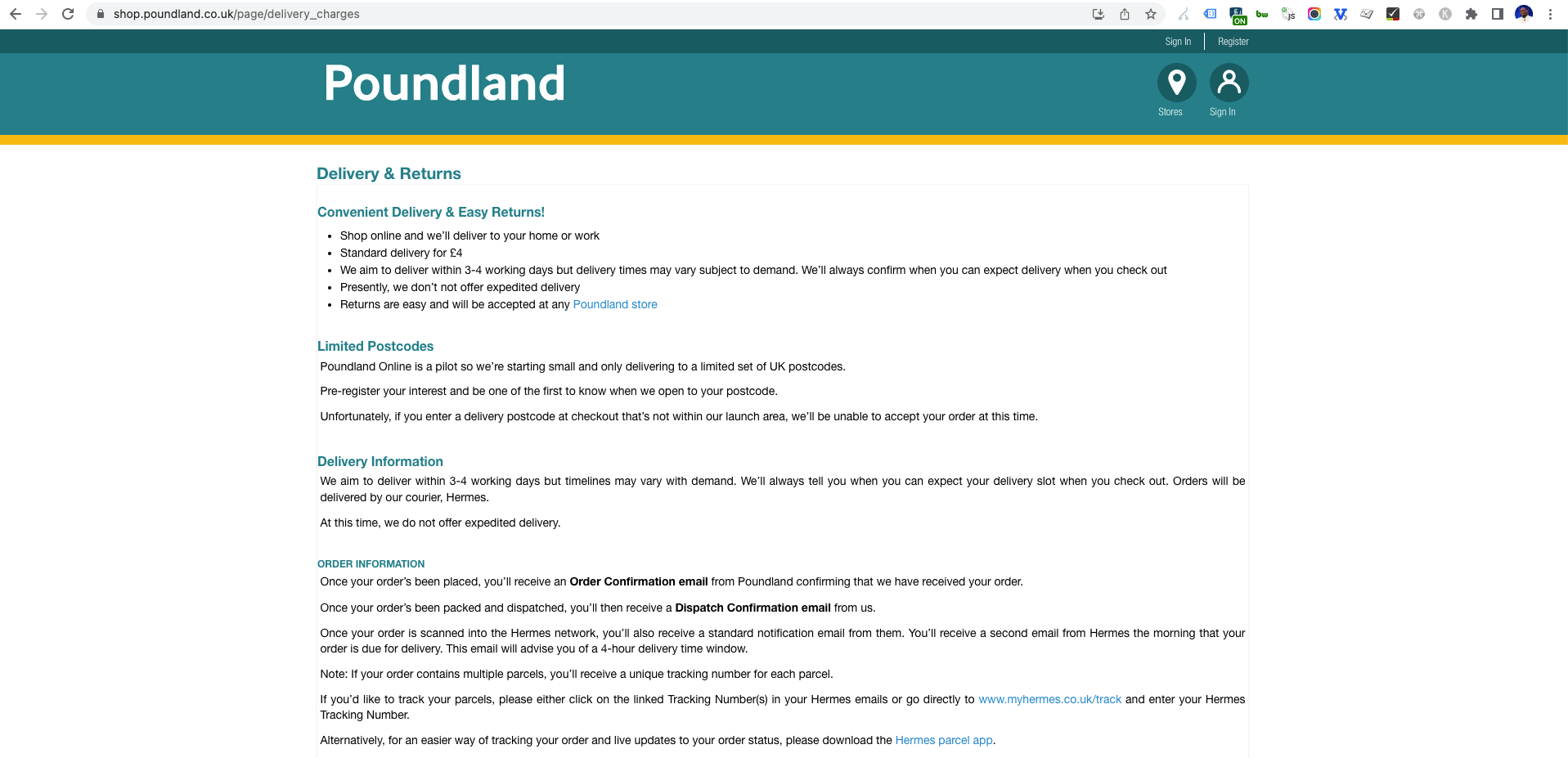
Poundshop.com could create content targeting this keyword and quickly begin to capture these keywords so that people who are looking to shop online with poundland or investigate deliveries etc can do so on the new website instead.
Of course, this is just one example and they’ll be plenty of other purchase-incentivised and branded keywords that poundshop.com should focus on ranking for to help capture more traffic that was previously destined for Poundland’s online store.
In summary…
Poundland are likely costing themselves customers, sales and quality organic traffic by neglecting to carefully plan a solid migration from shop.poundland.co.uk to poundshop.com
Additionally, the user experience is poor too; which will further be increasing losses and frustrating Poundland’s most loyal customers.
All is not lost, and it can be fixed – but the longer the migration is left unaddressed, the more damage will be caused and the more difficult it will be to reclaim those losses.
Even prioritising the top 100 or so URLs in terms of traffic and links on the old website and migrating these over to their respective destinations on poundshop.com then wildcard redirecting everything else would be a step in the right direction.
However, doing nothing is allowing Poundland’s competitors to steal customers, market share and take advantage of Poundland’s missed opportunity.
How’s that for value, Poundland?